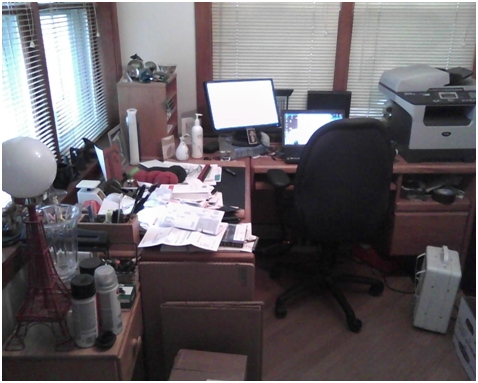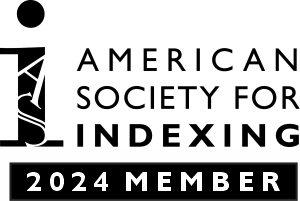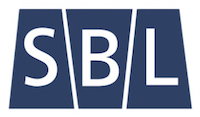We’re running a series of interviews to introduce you all to our wonderfully talented group of independent indexers and taxonomists who enable us to say “yes” to the variety of project types and turnaround times our clients are looking for. Today, we’d like you to get to know our talented book indexer and master taxonomist, Fred Leise.
 Your Business
Your Business
PI: How long have you been an associate at Potomac Indexing?
According to my indexing log, the first book I did for PI was in February of 2008. So that makes it nearly 10 years.
PI: Tell us your indexing (or other information access system) origin story. All superheroes, including indexers, have an origin story.
Like many indexers, I had never intended to be one. I was working in arts management and was doing lots of writing (this was in the early 1990s). The Graham School of Continuing Education at the University of Chicago was offering a two-year certificate in editing, so I decided to take it. And one of the courses I enrolled in was the indexing course (taught then by Leah Hotimlanska). We indexed 60 pages of articles on the centennial of the Statue of Liberty. Well, that was interesting, I thought, but never figured I’d be doing anything more with it.
About two years later, I got a frantic call from a professor at a local college (whom I had contacted about doing grant writing) asking whether I could index his new book. It seems that the schedule had slipped and the indexer he had originally contracted with could no longer take on the project. So I said yes.
A month after submitting the index, I got an email from the editor: that was a really good index and did I want to do more indexes for her. Since I was looking for some additional income at the time, I readily agreed. That publisher was Oxford University Press. And the rest is history.
PI: What are your specialties and/or favorite subjects?
I’ve done lots of cultural histories, international relations, and East Asian civilization and history, as well as some philosophy and history of religion, but I’ve really enjoyed some of the more unusual texts, such as one I recently did on El Helicoide, a spiral-shaped building in Caracas that was built to be a shopping mall but was never completed, and is now a police headquarters and prison.
I also enjoy cookbooks, although I rarely get chances to index them.
PI: Pick one of your favorite subjects and tell us why it fascinates you.
I enjoy doing biographies, although I haven’t done a large number of them. But the complexity of a lived life is fascinating. It’s sometimes a challenge to tease out the threads of the life: family and other relationships, career, the subject’s views on various topics, mental and physical health aspects, etc.
PI: What’s your best productivity or indexing secret tip (that you are willing to share, that is)?
One of the mantras we try to instill in the UCBerkeley indexing course, for which I am an instructor, is “OHIO”: Only Hand It Once. That is, don’t keep messing with entries once you have created them. The more you move things around, the longer your indexing process will take. And that’s really inefficient.
PI: What do you consider the most challenging aspect of the work?
Making sure that I “get” the author’s point of view and polemical standpoint, if you will, and represent that appropriately in the index.
PI: Where do you usually work? (Please include a photo of your office setup unless it’s a secret superhero location.)
My workspace is in a bright corner of our “family room.” My L-shaped desk provides lots of space for my laptop, a larger monitor to the left, my all-in-one printer/scanner/copier on the right and a writing area to my left (currently storage for filing). And yes, there’s some yarn on the desk. OK, so I’ve also got some knitting pattern printouts; just ignore those.
PI: Talk about your process (and this can be for book indexing or other related projects, like keyword tagging, embedded indexing, etc.). Any advice for other professionals—new and experienced?
I almost always start my indexing process with a review of the table of contents and introduction to get a feel for the metatopic and other high-level topics of the text. Then I’ll create structural (top-down) entries, which are often chapter-based topics (depending on how well the text is structured.) The structural entries usually end up comprising about 10% of the completed index, but provide a solid backbone for the index structure. Then I’ll move to a detailed reading of the text, building the bottom-up, generally more granular concepts in the index.
PI: What are your favorite/most-used tools, for indexing or other business purposes?
My laptop’s screen is filled with “sticky notes” that I create using a really good, free program called GloboNote. I’ve got my to-do list, schedules of upcoming projects, etc.
PI: CINDEX, SKY or Macrex (or other)? What do you like best about your choice?
CINDEX. When I started indexing, SKY Index Professional wasn’t even around. I love CINDEX’s “find” function, with its wide array of possibilities for finding, including Boolean searching and pattern matching.
PI: If you could only recommend one book about indexing, what would it be?
Do Mi Stauber’s Facing the Text. It’s a masterful overview of the “why” of indexing, as opposed to the “how.”
Personal Perspective
PI: Where do you live (just approximately, since this will be published on the Web)? And if you like, tell us a bit about your surroundings and folks you live with (including furry friends) if you wish.
I live in the Rogers Park neighborhood on the north side of Chicago, with my partner, who is a concert pianist. We’re close to a local university, so there are lots of students in the neighborhood. Several good restaurants nearby, including a great sushi place and a tapas restaurant. Plus we’re on several major bus routes and only a few blocks from the Chicago “L,” so transportation isn’t a problem (neither of us has a car).
PI: Tell us about your hobbies. Are there specific ones you turn to as a break from work, or any that are a special treat in between or at the end of projects?
I’ve been knitting for close to nine years and enjoy working on my various knitting projects in the evenings. Last year I created my own sourdough starter, so there’s bread baking every week. Not to mention lots of other baking (mostly from Maida Heatter’s dessert cookbooks). New this summer was making granita. And I’ve also begun home-made liqueurs. (The cherry wishniak came out great.) Yes. My name is Fred, and I’m a foodie.
PI: What’s the last book you read for fun?
A tome of four O’Neill plays, including Moon for the Misbegotten and Mourning Becomes Electra. I’m also in the middle of Anatole France’s The Gods are A-Thirst (Les Dieux ont Soif), set during the French Revolution.
PI: What’s your superpower?
Able to bake three different desserts in a single day. J
Thanks so much for your insights and stories!
_________________________________________________________
After a twenty-five year career in arts management, Fred Leise began indexing in 1995. Since then, he has been indexing nearly continuously (with time out for taxonomy consulting), specializing in scholarly works in international relations, cultural and political history, and landscape studies.
He is a founding member of the Institute of Certified Indexers, an instructor for the University of California, Berkeley Extension Division online indexing course, and has served several terms on ASI’s board of directors, including two terms as president.
He regularly presents at both national and chapter events and has written a number of articles on various aspects of indexing for Key Words and The Indexer. His article on Sherlock Holmes as indexer appeared in the fall 2013 issue of the Baker Street Journal.
To contact Fred about a project, please email him at fredleise@contextualanalysis.com.




Leave a Reply